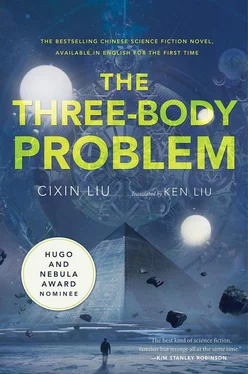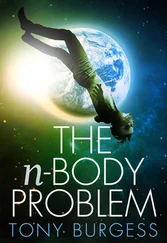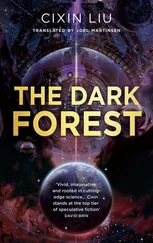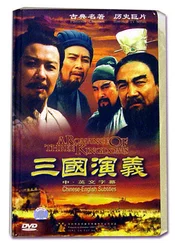“Based on my observations, there is no pattern to the sun’s movement at all.”
“That’s because you do not understand the fundamental nature of the world.”
“And you do?”
“Yes. This is why I’m going to Zhao Ge. I will present King Zhou with an accurate calendar.”
“But I’ve seen no evidence on this trip that you can do such a thing.”
“Predicting the sun’s motion is only possible in Zhao Ge, for that is where yin and yang meet. Only the lots cast there are accurate.”
The two continued on through the harsh conditions of another Chaotic Era, interrupted briefly by a short Stable Era, until they finally arrived in Zhao Ge.
Wang heard an unceasing roar that sounded like thunder. The sound was generated by the numerous giant pendulums that could be seen all over Zhao Ge, each tens of meters in height. The weight of each pendulum was a giant rock, suspended from a thick rope tied to a bridge that stretched between the tops of two slender stone towers.
All the pendulums were swinging as groups of soldiers in armor kept them in motion. Chanting incomprehensibly, they rhythmically pulled ropes attached to the giant stone weights, adding to the pendulums’ arcs as they slowed. Wang noticed that all the pendulums swung in step. From far away, the sight was awe-inducing: It was as though numerous giant clocks had been erected over the earth, or colossal, abstract symbols had fallen from the sky.
The giant pendulums surrounded an even more enormous pyramid, standing like a tall mountain in the dark night. This was King Zhou’s palace. Wang followed King Wen into a low door at the base of the pyramid, before which a few soldiers patrolled in the darkness, noiseless as ghosts. The door led to a long, narrow, dark tunnel going deep into the pyramid, with a few torches along the way.
As they walked, King Wen spoke to Wang. “During a Chaotic Era, the entire country is dehydrated. But King Zhou remains awake, a companion to the lifeless land. In order to survive during a Chaotic Era, one must live in thick-walled buildings like this one, as though one were living underground. It’s the only way to avoid the extreme heat and cold.”
After a long time in the tunnel, they finally arrived at the Great Hall at the center of the pyramid. Actually, the hall was not that big and reminded Wang of a cave. The man sitting on a dais and draped with a particolored hide was undoubtedly King Zhou. But what drew Wang’s attention was a man dressed all in black. The black robe blended with the thick shadows in the Great Hall, and the pale white face seemed to float in air.
“This is Fu Xi.” [19] Translator’s Note: Fu Xi is the first of the Three Sovereigns, a Chinese mythological figure. He was one of the progenitors of the human race along with the goddess Nüwa.
King Zhou introduced the man in black to Wang and King Wen. He spoke as though Wang and King Wen had always been there, while the man in black was the newcomer. “He thinks that the sun is a temperamental god. When the god is awake, his moods are unpredictable, and thus we have a Chaotic Era. But when he’s asleep, his breathing evens out, and thus we have a Stable Era. Fu Xi suggested that I build those pendulums you see out there and keep them in constant motion. He claims that the pendulums can have a hypnotic effect on the sun god and cause him to sink into a long slumber. But we can all see that so far, the sun god remains awake, though from time to time he seems to nap briefly.”
King Zhou waved his hands, and servants brought over a clay pot and set it down on the small stone table before Fu Xi. Later, Wang found out that it was a pot of seasoned broth. Fu Xi sighed, lifted the pot, and drank in great gulps, the sound of his swallows echoing like the beating of a giant heart in the darkness. After he was halfway done with the contents, he poured the rest over his body. Then he threw down the pot and walked toward a large bronze cauldron suspended over a fire in the corner of the Great Hall. He climbed onto the edge of the cauldron and jumped in, stirring up a cloud of vapor.
“Ji Chang, sit down,” [20] Translator’s Note: Ji Chang is King Wen’s given name.
King Zhou said. “We’ll eat in just a little while.” He pointed to the cauldron.
“Foolish witchcraft,” King Wen said, glancing contemptuously at the cauldron.
“What have you learned about the sun?” King Zhou asked. Firelight flickered in his eyes.
“The sun is not a god. The sun is yang, and the night is yin. The world proceeds on the balance between yin and yang. Though we cannot control the process, we can predict it.” King Wen took out his bronze sword and drew a yin-yang symbol on the floor, dimly lit by the fire. Then, he carved the sixty-four hexagrams of the I Ching around the symbol, the whole composition resembling a calendar wheel. “My king, this is the code of the universe. With it, I can present your dynasty with an accurate calendar.”
“Ji Chang, I need to know when the next long Stable Era will come.”
“I will forecast it for you right now,” King Wen said. He sat down in the middle of the yin-yang symbol, his legs curled under him. He raised his head to look up at the ceiling of the Great Hall, his gaze seeming to penetrate the thick stones of the pyramid, until it reached the stars. The fingers of his two hands began a series of rapid, complex movements, like components of a calculating machine. In the silence, only the soup in the cauldron in the corner made any noise, boiling and bubbling as though the shaman being cooked within was dream-talking in his sleep.
King Wen stood up in the middle of the yin-yang symbol. With his face still lifted to the ceiling, he said, “Next will be a Chaotic Era lasting forty-one days. Then comes a five-day Stable Era. Thereafter, there will be a twenty-three-day Chaotic Era followed by an eighteen-day Stable Era. Then we’ll have an eight-day Chaotic Era. But when this Chaotic Era is over, my king, the long Stable Era you’ve been waiting for will begin. That Stable Era will last three years and nine months. The climate will be so mild that it will be a golden age.”
“We have to verify your initial predictions first,” King Zhou said, his face expressionless.
Wang heard a loud rumbling from above. A stone slab in the ceiling of the Great Hall slid open, revealing a square opening. Wang shifted his position and saw that the opening led to another tunnel going up through the center of the pyramid. At the end of the tunnel he could see a few twinkling stars.
Game time sped up. Every few seconds in real time, two soldiers flipped over the sandglass brought by King Wen, indicating the passing of eight hours in game time. The opening through the ceiling flickered with random lights, and once in a while a ray of sunlight from the Chaotic Era shot into the Great Hall. Sometimes the light was weak, like moonlight. Sometimes the light was very strong, and the incandescent white square cast against the ground glowed so brightly that the torches in the Great Hall paled in comparison.
Wang continued to count the flipping of the sandglass. By the time it had been flipped 120 times or so, the appearance of the sunlight through the square opening became regular. The first of the predicted Stable Eras had arrived.
After fifteen more flips of the sandglass, the flickering light through the opening became patternless again, the start of another Chaotic Era. Another Stable Era followed, and another Chaotic Era. The starting times and durations of the various eras were not exactly as King Wen had predicted, but they were close. After the conclusion of yet another eight-day Chaotic Era, the long Stable Era he predicted began.
Wang kept counting the flips of the sandglass. Twenty days passed, and the sunlight falling into the Great Hall maintained the precise rhythm. Game time slowed down to normal.
Читать дальше












